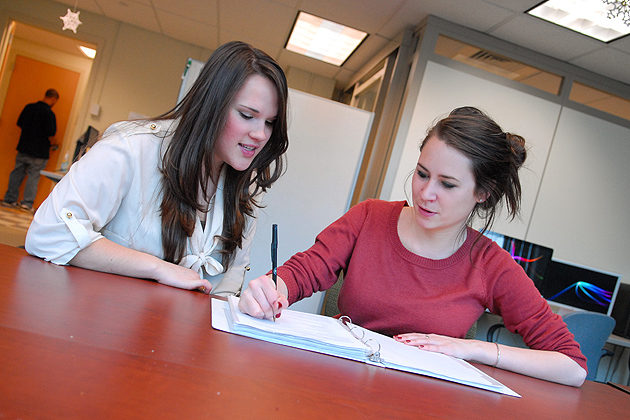
Kayla Everson and Sarah Harris have been busy shaping a successful future – for others, that is. Both seniors have been working with the academic intervention program UConn Connects to help their peers succeed.
UConn Connects, which is part of the Academic Achievement Center, offers help to students who are struggling academically. This semester, more than 400 students participated. Each participant is paired with a peer facilitator.
Everson and Harris began at UConn Connects as facilitators in 2009, and worked their way up to the title of ‘executive master coaches.’
The program appealed to Everson as a place to work on campus, since it related to her career goal of becoming a teacher. The Newington, Conn. native is majoring in secondary English education in the Neag School of Education. She hopes to teach 7th or 8th grade because, she says, “these two grades are important in a child’s life. It is when he or she is discovering who he or she really is. I want to help facilitate that process in a healthy way.”
She signed up as a facilitator with the hope of assisting first-year Huskies with their college transition.

Like Everson, Harris was also drawn by the opportunity to guide peers. Harris, who is from Portland, Conn., is studying secondary social studies education, psychology, and history and would like to teach at the high school level.
“As a future teacher, I was intrigued by the program’s peer focus,” Harris says, “and recognized that, as a high school teacher, it would be helpful to have had the opportunity to observe the challenges that students face upon entering college, in order to better prepare my future students for the academic transition.”
Each UConn Connects facilitator works with four to six participants on a one-on-one basis, meeting weekly throughout the semester. These meetings provide students with the tools and resources to develop strong note-taking and study skills that can be applied in any academic discipline.
Kevin Sullivan, director of academic support, who oversees the Academic Achievement Center and UConn Connects, describes Everson and Harris as “model helpers who demonstrate that UConn students can establish high standards for their academic, personal, and social growth, and then work consistently and tirelessly to achieve their goals.”
When the Academic Achievement Center was established, incorporating and building upon UConn Connects, Everson and Harris decided to get involved in the new center. Sullivan says the center was created to help all students, not just those who are struggling or on probation. Students who need to perform at the highest levels to be eligible for competitive scholarships, majors, or postgraduate opportunities can find appropriate assistance there. The center is staffed by undergraduate coaches who have previously been facilitators for UConn Connects.
Sullivan says Everson and Harris soon became key players in the new center: “They were instrumental in the structuring of the organization, providing key contributions to our weekly design meetings.”
They say their involvement in academic support programs was helpful in their own education, too. Says Everson, “I had the opportunity to teach time management skills, stress management, test-taking methods, and more. It kept my coaching skills fresh.”
Adds Harris, “Our common desire to teach made us a good team. We worked together to develop new ideas for the UConn Connects curriculum.”
In spring 2012, both seniors began student teaching off campus as part of their degree program and were no longer able to work on campus. Everson has been teaching an 8th grade English class at East Hartford Middle School, and Harris taught 10th grade world history and two 12th grade psychology courses at Manchester High School. Both will go on to complete the Neag School of Education Integrated Bachelor’s/Master’s Degree program next year as master’s students.
Sullivan says he is proud of the pair and their contribution to academic support programs: “Leading by example, with their own immense GPA’s and involved campus life, Kayla and Sarah modeled all of the strategies, techniques, attitudes, and cognitions necessary to produce consistent academic excellence.”



